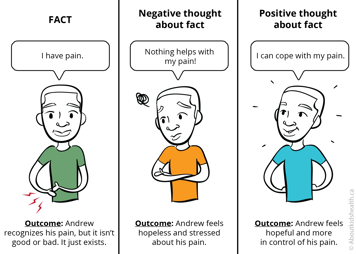Most teens think a
stressor (the thing making them feel stressed) causes them to feel sad or overwhelmed. However, it is often not the stressor itself, but the way we think about the stressor.
Thinking about pain as a stressor…
Thoughts that might increase your stress or feelings of hopelessness include, "Nothing helps my sickle cell pain" or "I must not do any sports because I can't risk a pain flare".
Other thoughts such as, "I can cope with my pain" or "I will be able to do activities that I enjoy" can increase your sense of hope and reduce stress.

Automatic thoughts
Most of our thoughts are automatic: we don't even realize we are having them. For example, when you brush your teeth, do you think about each up stroke and each down stroke and each tooth? Probably not!
Most automatic thoughts, like those that control how you brush your teeth, are OK and helpful. If we didn't have automatic thoughts, we probably wouldn't get a lot done.
But some automatic thoughts, like those you might have when you are in pain or stuck at the hospital, are not so helpful and can make you feel worse.
If you don't realize you are having negative thoughts, it may be hard to know how they are affecting the things you do. So, it can be helpful to learn to identify any automatic negative thoughts.
Your automatic thoughts
Think about some of the stressors you listed earlier. What automatic thoughts pop up when you think about the situation that makes you feel stress? Were these thoughts mostly positive or mostly negative?
Positive versus negative thoughts
Positive thoughts usually lead to good feelings and emotions.
Examples of positive thoughts
- I did a really good job on my test!
- I'm a good friend.
- I can finish this homework!
Negative thoughts are more likely to lead to negative feelings.
Examples of negative thoughts
- I'm not good at school.
- This pain will never stop.
- I look terrible!
Everyone experiences both positive and negative thoughts.
Focusing on negative thoughts

It is normal to have negative thoughts now and then. Usually, they simply pass through our minds and do not cause any problems.
However, focusing on negative thoughts and situations typically leads to bad feelings. Imagine if you told yourself, "I will never pass my math test" over and over for an entire day. You would probably not feel very good about doing the test!
Catastrophizing
Catastrophizing is a type of negative thought that makes us worry that an extremely bad thing—a catastrophe—will happen, often as a result of a smaller thing that has already happened. One teen with sickle cell disease has called this "making boulders out of pebbles."
Here are some dictionary definitions of catastrophe.
- Great, often sudden calamity
- A complete failure; a fiasco
- A sudden violent change in the earth's surface; a cataclysm
Jasmine’s catastrophizing thoughts
Take a look at this example to see how teens might have catastrophizing thoughts.
Jasmine didn't get a chance to finish her homework for her first-period math class because she was at the hospital for a clinic appointment. She was dreading going to class. When she sat down at her desk and everyone started turning in their homework, she had two main thoughts.
- “Oh no! I forgot my homework. Now the teacher will hate me and I'll fail the class! I won’t graduate.”
- “My parents will be so angry with me! My life is over!"
One way to know if you are catastrophizing is to look at the facts. Ask yourself, “On a scale of one to 10, how likely is it that my negative thoughts will come true?”
In Jasmine’s case, it is very unlikely that any of her worries will actually happen just from not turning in her math homework. So, we would consider her way of thinking to be catastrophizing.







